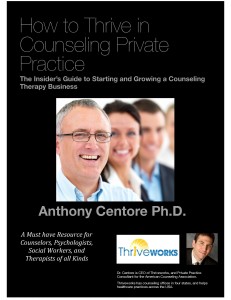Should Counselors in Private Practice Specialize?
 A question I’m often asked by counselors is whether they should specialize. That is, should they focus their counseling practice in a specific area? It’s a hard question to answer, as even successful business people disagree. In this column, I’ll describe four ways that counselors can specialize, and offer some insights into how specializing can help (or hurt) a counseling practice.
A question I’m often asked by counselors is whether they should specialize. That is, should they focus their counseling practice in a specific area? It’s a hard question to answer, as even successful business people disagree. In this column, I’ll describe four ways that counselors can specialize, and offer some insights into how specializing can help (or hurt) a counseling practice.
There are four areas in which counseling practices can specialize: (1) Populations Served, (2) Problems Treated, (3) Treatment Methods Used, and (4) Business Practices. Each is described below.
- Populations Served
- Problems Treated
- Treatment Methods Used
- Business Practices
Children, couples, firefighters, Mormons, Texans, criminals, and Texan criminals: Specializing in a client population means limiting one’s practice to serving a group with an identifying characteristic other than the presenting problem.
This type of specialization is most successful when members of the population are known to limit their search to counselors who work specifically with their population. For example, many Christians will refuse to see a counselor that does not identify him- or herself as a “Christian counselor.” Similarly, executives, GLBTQ clients, and many ethnic groups will seek out therapists with specific expertise in helping persons in their population.
The downside of specializing in a specific population is that one limits their potential client base. A colleague of mine had a website with a header that said, “The Child and Adolescent Experts.” While the specialization helped the practice win both school and court contracts (working with delinquent adolescents), the practice still struggled because the local demand for child therapy was too small. As soon as they expanded their practice to encompass families and couples, their business grew.
Broadening (or diluting) their specialization worked for them. However, it’s also weakened their grip on the child and adolescent market. Since they’re no longer marketing themselves as “the child and adolescent experts,” other practices in town are more able to compete for those clients.
From Social Anxiety Disorder to substance abuse, there is no shortage of psychological problems and life issues in which to specialize.
Specializing in a specific problem is more than simply adding an item to a practice’s menu of disorders treated. It takes commitment to limit one’s practice to a specific problem—and both clients and colleagues tend to respect counselors willing to focus.
Moreover, if you choose a problem that the average clinician finds difficult or undesirable, such as severe mental illnesses, autism spectrum disorders, or high-risk clients, the specialization should help to encourage peer-referrals.
Alternatively, if you brand your practice as “the depression specialist,” peer-referrals will likely be sparse. Still, you will gain the attention of potential clients with depression, who may look favorably upon the practice built specifically for their presenting problem.
Treatment methods can include psychoanalysis, Eye Movement Desensitization and Reprocessing (EMDR), Dialectical Behavioral Therapy (DBT), positive psychology, and many more. Specializing in a method of treatment is a good way to recruit the savvy client who knows the type of treatment he/she wants. However, the average client is rarely focused on treatment method.
I often see counselors excited about their EMDR certifications; but less often do I see those certifications become the genesis of a thriving practice. Conversely, I have known of a tight knit community of psychoanalysists who refer within their circles, and seem to have a loyal following of psychoanalysis-seeking clients.
In my own clinical work, rarely (but sometimes) do clients seek me out because of my counseling methodology. Hence, from a business perspective, while there often isn’t a big upside to specializing in a treatment method, there probably isn’t a huge downside either.
Walk in appointments, phone or video sessions, at home therapy, 24-hour customer service, high prices, low prices, intern-level counselors: The business decisions that make up a practice’s unique brand identity are limited only by the founder’s imagination (and resources).
But can business practices be a specialization? Yes! If every session is $600, and you offer caviar to your clients, your practice specializes in providing a high-priced, first-class, counseling experience (ok, that’s debatable, but you get the point). If sessions are $40 and lack frills, you specialize in providing an economic counseling option, much like Southwest provides low cost airfare.
Which identity to choose? Customer service is in demand right now, as recent polls show that most consumers are willing to pay more for goods and services in exchange for a great buying experience. Also, some business practices are evergreen—such as affordability and convenience (No one is ever going to say, “I wish this service cost more, and was harder to use.”). Still, to really set your practice apart, clients need an experience that is delightful, memorable, and unique.
Specialization Tips
Below are seven tips based on my experience working with counselors starting new practices.
- Don’t specialize in Group Therapy
- Avoid Creating a Holistic Health Program
- Consider Demand
- Stay Consistent
- Be the best in the world
- Take a flyer
- Specialization can work in a small town, too
Some counselors, starting out, think that offering group therapy will help them build a caseload. Nothing could be further from the truth. Instead, groups tend to work best when a practice has an over-abundance of incoming clients who want help. For example, a group is a good option if your practice is receiving a never-ending influx of clients who are court-mandated to receive anger management.
A counselor starting a private practice might get the idea to begin a holistic health program. These programs are usually counseling combined with some number of ancillary services such as yoga, exercise, nutrition, meditation, massage, etc. In addition, they often require some type of upfront commitment from the client to participate. The idea is that by taking a “whole health” approach to care, the practice will become differentiated in the marketplace, and also be more helpful to the clients than psychotherapy alone. However, such programs create a barrier for building a practice, because most prospective clients don’t want to sign up for a program, they just want to try out a normal counseling session.
Before selecting a specialty, try to determine if there is enough demand for what you are offering. Tony Hsieh, CEO of Zappos, states, “In business, one of the most important decisions for an entrepreneur or a CEO to make is what business to be in. It doesn’t matter how flawlessly a business is executed if it’s the wrong business or if it’s in too small a market. Imagine if you were the most efficient manufacturer of seven-fingered gloves. You offer the best selection, the best service, and the best prices for seven-fingered gloves—but if there isn’t a big enough market for what you sell, you won’t get very far.”
Don’t jump ship on an idea that’s working. In The 22 Immutable Laws of Branding, authors Ries and Ries write, “Consistency built the Little Caesars brand, and lack of consistency is in the process of destroying the Little Caesars brand. “Pizza! Pizza!” became the chain’s rallying cry. Where else could you get two pizzas for the price of one? The power of this branding program made Little Caesars the second-largest pizza chain in America. “Why should we limit ourselves to take-out pizza only?” the bored executives asked. So Little Caesars introduced “Delivery. Delivery.” And promptly fell to third place in sales, after Pizza Hut and Domino’s Pizza.
It gets worse. In order to turn the chain around, Little Caesars went big. The small pizza became a medium-size pizza. The medium-size pizza became a large pizza. And the large pizza became an extra-large pizza. Talk about confusion. “I’d like to order a medium-size pizza, please.”
“Do you want a Pizza Hut medium, which is actually our small size? Or do you want a Little Caesars medium, which is actually a Pizza Hut large?”
“Uh . . . do I still get two pizzas for the price of one?”
“Pizza! Pizza!? No, we don’t do that anymore.”
A pity. Little Caesars had one of the best brands in the pizza category. The only brand focused on takeout. The only brand with an identity and a message. (Pizza! Pizza!) And now it has nothing.”
In order to have a truly great practice, you need to be best in the world. Sound overwhelming? Don’t worry; this can be both highly focused and location-specific. For example, you could be the best at “providing counseling to single mothers in central Virginia” or “providing CBT to undergraduate students attending Virginia Tech.” When potential clients are looking for a counselor, they are looking for the best option in their world. That is, the best counselor within a few miles, under their budget, who has openings on Thursdays or Saturdays. Jim Collins elaborates, “We confront the brutal facts of what we can—and equally cannot—become the best in the world at, and we do not allow bravado to obscure the truth.” Of what can you be the best in the world? Of what can you not?
If you have a new, creative idea for your practice, but are not sure if it will work—give it a try! Don’t bet the farm on the idea, but don’t play the game so safe that you never take any chances. When starting a practice, a lot of what you do is going to be like throwing handfuls grass into the air and seeing if it catches the wind. Most will just fall to the ground, but every once in a while something will catch air—and take off!
I used to think that in order to succeed in a small city or town, a counseling practice would need to offer broad and general services. However, this isn’t always the case. While there are less people, there may also be fewer clinicians. This past year, I spent a lot of time in a small city. Residents are paying big city prices to meet with the few counselors who are known to be good at couples therapy, or eating disorders. Supply and demand works in small towns, too.
Hot Off the Press! How to Thrive In Counseling Private Practice: The Insider’s Guide to Starting and Building a Counseling Therapy Business

As counselors, when we venture into private practice for the first time, we make the difficult transition from technician to entrepreneur. The immensity of this transition cannot be overstated.
Learn More! Counseling Private Practice Book
(Includes a Bonus MP3 audio file from the author titled “How to Build Your Counseling Practice to Sell”)














I’m in Arizona. Here, the LPC is the counselor that does mental health counseling (we don’t have a “LMHC” license). Perhaps NY uses LMHC in lieu of LPC. The state licensing board should have a list of what training and degrees are needed for each license.
I went online briefly to see what the LMHC description was for NYS. It looks similar to the LPC in AZ. Here is the link for the description of LMHC: http://www.op.nysed.gov/prof/mhp/mhcbroch.htm
Hope this info is helpful.
Yes, that’s exactly correct Susan! Theres even more of them–in some states it’s “LCPC,” and in some its “LPCC.” It gets confusing!
Thank you for the information. Much appreciated. By the way, would you know the difference in practicing as a Licensed Professional Counselor (LPC) and a Licensed Mental Health Counselor? The description of a LPC in who they serve and what they can practice in NYS seems missing. Would you know? Thank you for your time.
Thanks for writing this article!
Thanks for reading, David!